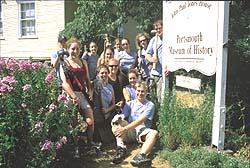 |
 |
| current issue |  |
past issues |  |
send a letter/news |  |
address update |  |
advertise |  |
about us |  |
alumni home |
Campus Currents
Having Fun, Doing Goodby Shannan Goff '03
At the beginning of that week in late August, they were 30 strangers about to take the first daunting step into college life. By the end of the week, they were 30 friends, brought together by a common interest in community service. These freshmen were the first to participate in a new UNH program, the Pre-Orientation Volunteer Experience in Service, developed by the First Year Programs office and the Partnership for Social Action as a way to help freshmen form early bonds with one another and the UNH community.
 A new program for first-year students promotes volunteer service with local community-service organizations. - by Ralph Morang |
The students spent the week participating in leadership and team-building activities and volunteering with Seacoast nonprofit organizations. Mark Haley '06 says that the experience was both rewarding and fun. He recalls the day the group spent at the Homemakers of Strafford County's Adult Day Out Program, baking, singing and putting on a fashion show for the elderly people. "The feeling you get afterwards, that's really all I need, to know that I've done some good," he says.
Allison Bjorndahl '06 recalls how the students mixed work with pleasure. They were working at the Seacoast YMCA's Camp Gundalow, painting playground structures. Students sang as they worked, Bjorndahl says, and everyone was having a good time. "Everyone had paint all over them. We were painting each other as we painted the equipment." Afterwards, they went swimming--fully clothed.
The first-year volunteers are continuing a long tradition of community service at UNH. A fall 2002 survey of students living in the residence halls showed that 22 percent were involved in community service on their own; 18 percent participated with a service volunteer group; and 16 percent did community service as part of a class requirement--up from 10 percent last year. The overall number of student volunteers is probably higher than the survey indicates, since it did not include students living off-campus or in Greek houses--a population that is usually very involved in community service. ~
Easy to print version
blog comments powered by Disqus

